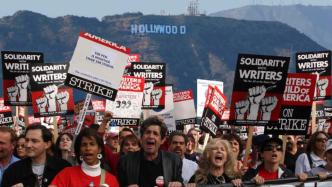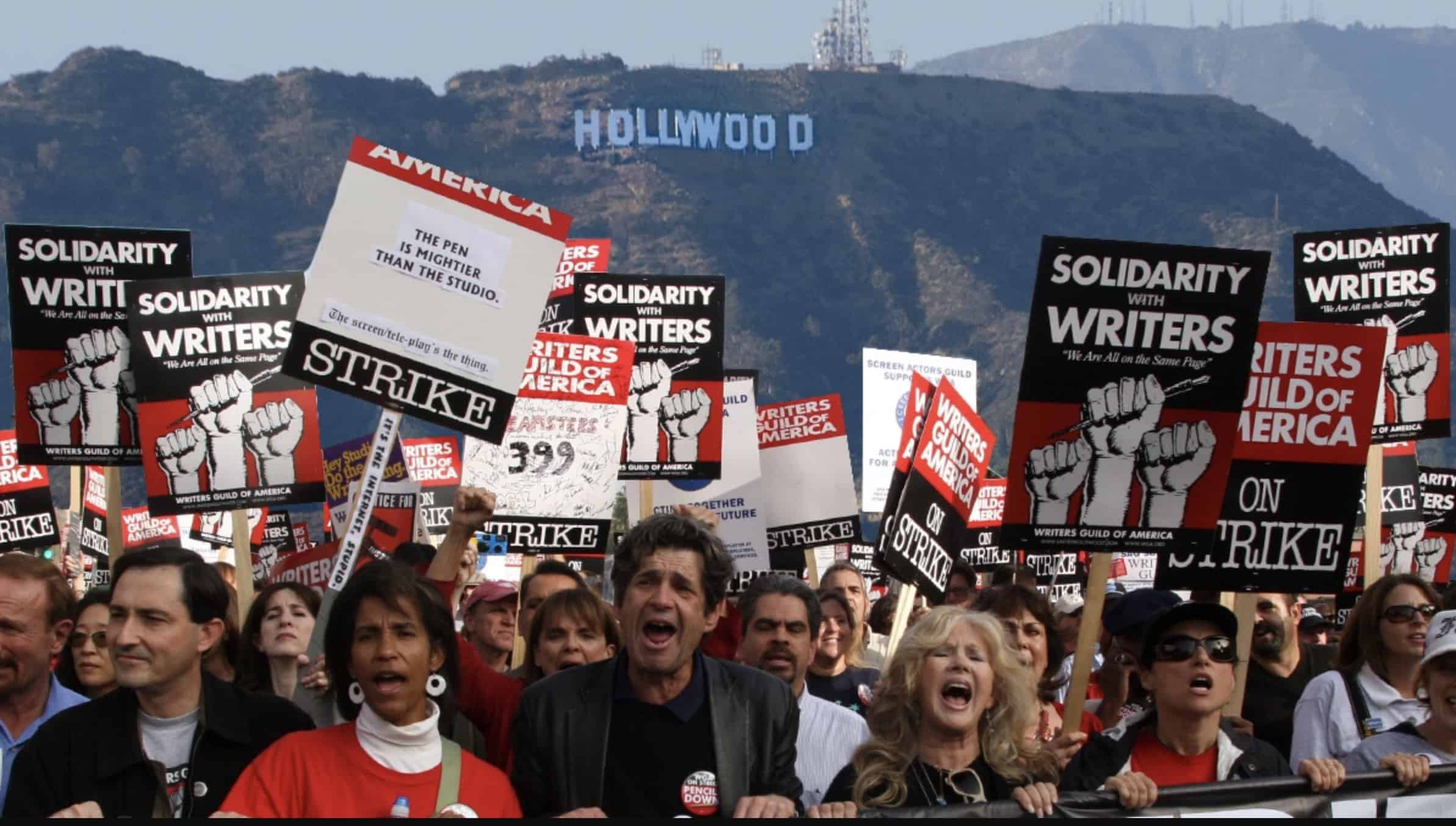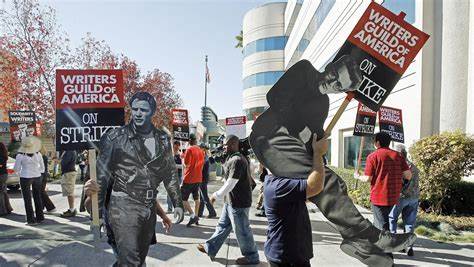
Starting on May 2 local time, members of the American Screenwriters Guild organized a strike, which has lasted for three days.
During the strike, the screenwriters came to the headquarters of Disney, Netflix, Amazon, Paramount, Fox, Universal, Sony, Warner and other Hollywood film and television companies in Los Angeles and New York at a fixed time every day, and played "CEOs have Yachting, the screenwriters have a mortgage", "A fair contract is required, otherwise we will spoil "The Battle of Succession", "AI can't replace the screenwriter" and other protest slogans to fight for a compromise from the management.

Starting on May 2 local time, members of the Writers Guild of America organized a strike
Big differences between labor and management
According to the regulations of the union, after the start of the strike on May 2, its screenwriters are not allowed to write, rewrite, promote or even discuss any existing works or new projects of any film and television companies affiliated to the Film and Television Producers Alliance. "Thief" will be severely punished by fines or even delisting.
Of course, in terms of living expenses, the screenwriters union will also use their strike fund of up to 20 million US dollars at this time to ensure that the strike screenwriters live well. As for the new screenwriters who have not yet joined the Screenwriters Union, the union stated that although it has no right to ask them to join the strike, it also strongly recommends that they refrain from becoming an accomplice of the management at this critical moment, otherwise these people will want to apply to join in the future The screenwriters union will definitely not be approved.
It's been 15 years since the last Hollywood screenwriters' strike. Historically, the Hollywood screenwriters' strike led by the screenwriters union has occurred several times. The earliest can be traced back to 1960, and the longest one was in 1988 (153 days). Basically, most of the demands of the screenwriters are focused on increasing income, increasing income from program rebroadcasts and other practical livelihood issues, and most of them can be satisfied in the end. The resulting economic impact is, in fact, unwelcome to both employers and employees.
The strike this time is the same. One of the strikers is the Writers Guild of America, which was founded in 1954 and currently has more than 11,500 members. On the other side is the Alliance of Motion Picture and Television Producers, established in 1924. It is a representative of the interests of three to four hundred film and television production companies in the United States. Carry out interest negotiations in order to seek the maximum benefit for the employer.
Back in May 2020, the above-mentioned two parties had reached an agreement on the minimum wages of screenwriters and replay benefits, but according to the usual practice, the validity period was only three years, which happened to expire in May this year. In order to reach a new three-year agreement, the two sides sat down to negotiate as early as six weeks ago, but in the end they failed to negotiate before the agreement expired, so there was this strike.

At present, the psychological price gap between labor and capital is still quite large. According to the calculations of the Screenwriters Union, their requirement is that the total salary of all screenwriters under the union in the next three years can reach 429 million US dollars per year. However, the current conditions offered by the Producers Union are only about 86 million US dollars per year, which is several times different. However, compared with the salary increase, it is said that what makes the management unacceptable this time is the other "strict" requirements of the labor side.
The Screenwriters Union emphasized that in the face of the pressure of life where everything is rising, if the income of screenwriters does not increase, it will shrink in disguise. According to his statement, half of the current American TV screenwriters have received salaries that have just reached the industry's minimum salary level. Ten years ago, people who encountered this situation accounted for only one-third of all TV screenwriters. one. The reason for the decrease in income is that the employment environment for screenwriters has deteriorated: even if they can still receive new jobs, the workload is less than before, so the income has also dropped accordingly. In the words of the Screenwriters Union, the current screenwriters have become "Part-time workers" are no different from the takeaway and express delivery industries.
For this reason, the Screenwriters Union has taken a particularly tough stance on the employment rate and employment time this time. Specifically, they put forward a hard requirement for the employer: each film and television drama project must hire at least six screenwriters, so that more pens can be employed and have work to do. Moreover, the employment contract must have a guarantee of minimum hours of work. After all, compared to traditional dramas that often have more than 20 episodes per season, current streaming web dramas often only have eight, nine, or ten episodes per season. The reduction in working hours naturally means a decline in screenwriter income.
However, after experiencing the epidemic, Hollywood film and television companies also have their own difficulties. Especially now that Warner and Disney are laying off large-scale employees, it has become an industry consensus to increase revenue and reduce expenditure. Therefore, each crew actually saves as much as they can, and uses as few people as they can. Therefore, on the point of hiring at least six screenwriters, the employer's attitude this time is quite tough, and they are unwilling to make concessions.
Many dramas and talk shows are affected
The last strike by the Writers Guild of America, which took place between November 2007 and February 2008, lasted exactly 100 days. It is said to have cost the U.S. economy as much as $2.1 billion, and "30 Rock," "The Big Bang Theory," "24," "Bones," "Boston Legal," "Criminal Minds," "Breaking Bad," "Desperate" A large number of popular American dramas such as Housewife and Lost have all been affected, or their broadcasts have been postponed, or the original number of episodes has been reduced. Even "4400", which was originally hailed as a divine drama by many audiences, was due to this strike, which caused the story of the fourth season to be unfinished and ended abruptly, causing irreparable shortcomings for all creators and audience groups. The highly acclaimed "Hero" in the first season also reduced the content of the second season, which eventually led to a sharp decline in the quality of the entire series.
This time the strike is just the beginning, but some episodes are being produced, such as the third season "Primary School", the eighth season "Big Mouth", the sixth season "Cobra", the second season " Night Court" and the third season "Wasp" have been affected to varying degrees, and work has been partially or completely suspended. However, there are also episodes such as the second season of "Good Omens" and the second season of "Dragon Family" that are also being filmed. Because all the scripts have been prepared in advance, the shooting will not be affected, and I believe they can be broadcast as scheduled.
The most affected right now are a group of TV talk shows that are popular with American audiences. Because they have to keep up with current events, these programs need to write copywriting in real time, and they cannot prepare scripts in advance. I can only stop cooking completely. Including "Jimmy Chicken Feather Show", "Last Week Tonight Show", "Seth Late Show", "Puma Live Show", "Today Show", "Late Show with Stephen Colbert", "Jimmy Fallon Tonight Show", almost all The production of new programs for late-night celebrity talk shows has stopped, and they can only broadcast previous programs during the original live broadcast time. The well-known variety show "Saturday Night Live" also encountered the same problem, and this Saturday's episode had to be cancelled.


